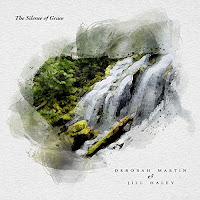JEFF GREINKE (his personal website is here)
Other Weather
Spotted Peccary (2021)
I first heard Jeff Greinke's music when I bought In Another Place (released in 1993) and to say it was love at first listen would be apt. Over the decades, I have intently followed his career arc as he evolved and morphed, going through assorted phases, and each shift in his creative focus has both surprised and delighted me. I know that some of his hard core dark ambient fans (who enjoyed earlier releases like 1985's Cities In Fog and 1987's Places of Motility felt "cast adrift" as Greinke entered a "softer" period with masterpieces more akin to Tim Story's tragic minimalism, best represented by 2007's Winter Light and 2009's Virga, but no matter which direction Jeff Greinke took his music in, I was left fascinated and appreciative of the scope and depth of his composing and performing talent.
Other Weather presents a hybrid of sorts, encompassing a variety of the various musical tableaus he has crafted over the past 20+ years. The title may be a call back to 1994's Big Weather, or even to the aforementioned Virga, and each of the eleven tracks' titles features either a subtle or more direct connection to weather itself (e.g. "Rain Through the Night," "Snow Across a Windswept Plain," "Clouds Like Flying Saucers"). Greinke has always shared Tim Story's unique and evocative way when it comes to giving tracks their titles.
All that out of the way, Other Weather is freakin' beautiful and can stand alongside his entire pantheon of previous excellence, and for me, landing near the top of his lengthy discography. Greinke leans more heavily on his own talent and less on guest artists (e.g. compared to the aforementioned Winter Light and Virga), with Heather Bentley (cello, violin, viola), Alex Guy (viola), and Paris Hurley (violin) as well as Greg Campbell (French horn, small percussion), and James DeJoie (clarinets and flutes) appearing only on either tracks 5 and/or 10. The rest is all Greinke, demonstrating brilliance via an assortment of keyboards and whatever other instruments he plays (none are specifically listed for him).
More than once, I "caught a whiff" of the soft, subtle, dark ambience of In Another Place, which is "light" compared to a lot of dark ambient music, suffused with a subtly glowing/flowing gentleness that is discernible among the darker shades of menace and mystery. Other tracks hew closer to his more recent exploration of warmer ambient soundscapes. However, make no mistake about this being "new agey" (which, as you should know by now, is not meant as any criticism of that esteemed genre, but merely a point of reference for the sake of more clearly defining the overall characteristic of Greinke's music). What Greinke does so well, both here and on some of his other albums, is coalesce his ambient textures around a plaintive piano melody, which is sometimes centered around minor notes and other times slightly more "optimistic" major ones. Many tracks feature either a strong sense of dramatic tension, or at least an undercurrent of it. In this regard, and especially when paired with the weather references in the song titles, his music reflects the almost limitless possibilities of our planet's weatherscapes.
Those tracks that feature the string and/or wind instruments ("Snow Across a Windswept Plain," and "Icebreaker") share similar motifs and themes to Winter Light and Virga, but not in any way derivative of either of those previous works. The other nine tracks traverse a shifting series of sonic landscapes consisting of a bedrock of piano and a wide variety of ambient textures, e.g., the chime-like tones in "Outflow" or the extremely subtle koto-like accents in "Storm Chaser." "Rain Through the Night" best exemplifies the more shadowy side of Greinke's musical persona with a series of repeating piano phrases laid over subdued yet moody atmospheric touches.
Before I sum up, I just want to give props to Howard Givens for his, as usual, superb mastering job on the album, which Jeff Greinke produced on his own and did the superlative mix as well.
If Jeff Greinke is relatively unknown to you (which begs the question, Why?), Other Weather is a great initiation to this under-appreciated artist in the ambient field (who also branches out in interesting ways on albums such as 2013's Scenes From A Train. Greinke is one of a few select artists who always elicit the musing "I can't wait to see what he/she does next?" from me. Other Weather continues to have that effect on yours truly. It's easily one of the best records of 2021.
Click this link for purchase options via the Spotted Peccary website




